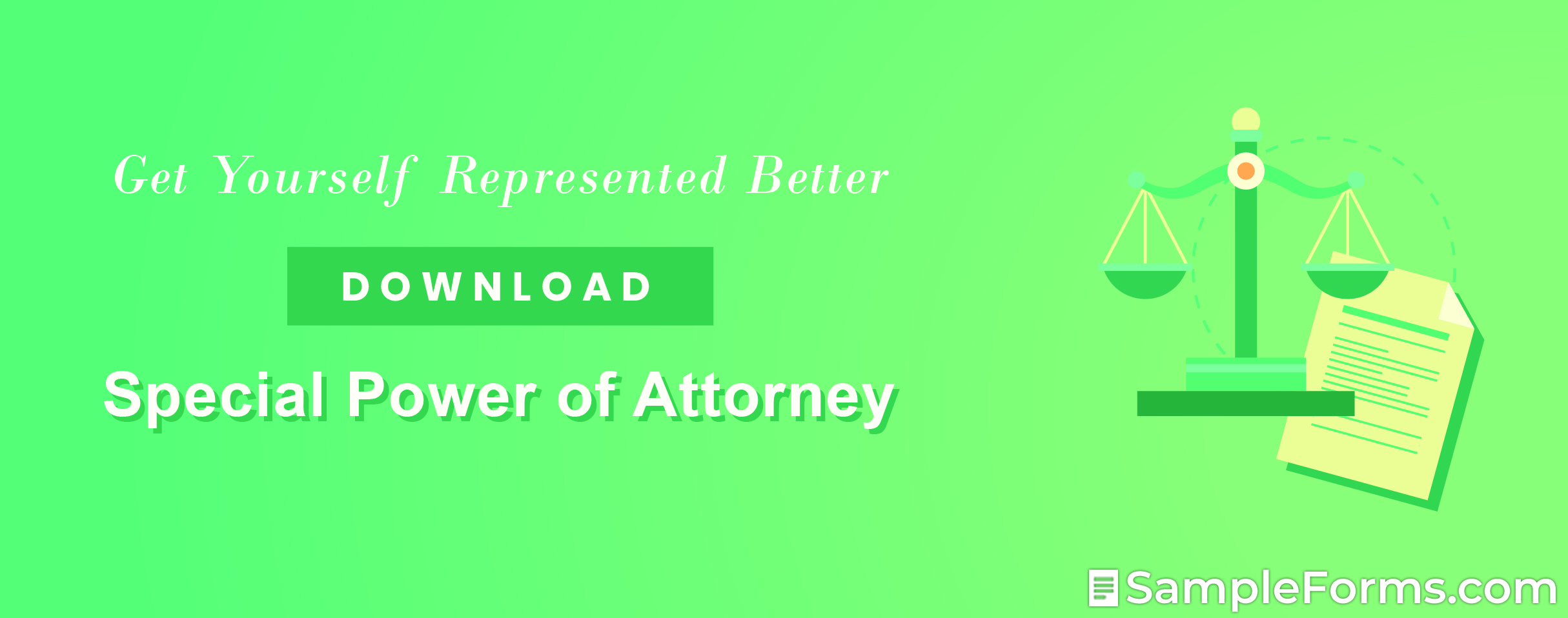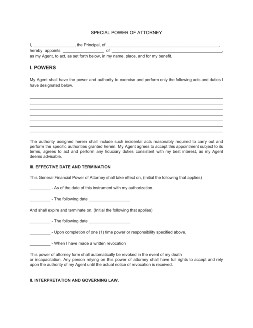- Eviction Notice Forms
- Power of Attorney Forms Forms
- Bill of Sale (Purchase Agreement) Forms
- Lease Agreement Forms
- Rental Application Forms
- Living Will Forms Forms
- Recommendation Letters Forms
- Resignation Letters Forms
- Release of Liability Agreement Forms
- Promissory Note Forms
- LLC Operating Agreement Forms
- Deed of Sale Forms
- Consent Form Forms
- Support Affidavit Forms
- Paternity Affidavit Forms
- Marital Affidavit Forms
- Financial Affidavit Forms
- Residential Affidavit Forms
- Affidavit of Identity Forms
- Affidavit of Title Forms
- Employment Affidavit Forms
- Affidavit of Loss Forms
- Gift Affidavit Forms
- Small Estate Affidavit Forms
- Service Affidavit Forms
- Heirship Affidavit Forms
- Survivorship Affidavit Forms
- Desistance Affidavit Forms
- Discrepancy Affidavit Forms
- Guardianship Affidavit Forms
- Undertaking Affidavit Forms
- General Affidavit Forms
- Affidavit of Death Forms
Special Power of Attorney
Having someone acting on your behalf is very important, especially on matters such as the payment of taxes, acquisition of assets, and many more. However, you should always provide proof that you authorized such actions since they may have legal weight and consequences. In these situations, a Special Power of Attorney is an important instrument that allows you to authorize someone to act on your behalf. Read More
Special Power of Attorney
- What Is a Special Power of Attorney?
- How To Write a Special Power of Attorney
- Frequently Asked Questions
- Does a special power of attorney also extinguish when I become incapacitated?
- Can I assign a relative as my agent in a special power of attorney?
- Do we need to notarize a special power of attorney?
- How many witnesses do I need to sign the special power of attorney?
- What powers should I grant my agent in a special power of attorney?
What Is a Special Power of Attorney?
A special power of attorney is an instrument that grants an agent, or attorney-in-fact, limited authority to act on legal matters on your behalf. This instrument enables your agent to work and decide on matters, such as in participating in certain legal proceedings, making transactions involving your assets, and even on medical concerns to some extent. Unlike other types of power of attorney, this type of power of attorney automatically extinguishes after a specific responsibility is fulfilled.
How To Write a Special Power of Attorney
Executing special powers of attorney are very helpful in times when your hands are too full to attend on an important transaction. This is because it allows you to have someone act or fulfill such transactions in your name and place during your absence. And if you’re in need to make one right now, here are the steps on how to write a special power of attorney.
1. Introduce the Principal and the Agent
The parties of this power of attorney are namely the principal and the agent, also known as an attorney-in-fact. And, introducing them right at the beginning of the instrument establishes the persons bound by its provisions. Introduce the parties with their names and addresses alongside their respective roles when writing your document.
2. Specify the Powers of the Agent
A power of attorney grants someone the authority to act and decide on legal matters on the principal’s behalf. But unlike other instruments of the same function, this one only allows limited and specific powers for a specified period. When writing your special p, specify one or several responsibilities that the agent is authorized to fulfill under your name. And, do so with your initials before each sentence.
3. Set the Power of Attorney’s Term
What sets this power of attorney from the others is that it extinguishes right after one or all responsibilities granted are fulfilled. But just like other powers of attorney, the document also has a definite period of validity and is subject to revocation by the principal. To complete this part, all you need to do is set the instrument’s effective date and expiry as well as the conditions of its revocation and termination.
4. Execute Your Power of Attorney
Executing your power of attorney enables its provisions to take effect immediately. This means that your agent can now begin in fulfilling the tasks that you’ve given them. To make this possible, simply sign the special power of attorney along with your agent. You can affix your signatures right at the bottom part of this instrument.
5. Have a Notarial Seal Stamped on It
Aside from signatures, the paper also needs to have a notarial seal stamped right on its face. This is so to make its provisions legally enforceable and allows the agent to exercise the powers and authority granted by the principal. All you need to do is to visit your local notary public and have several associates sign on the instrument as witnesses.
Frequently Asked Questions
Does a special power of attorney also extinguish when I become incapacitated?
Yes, it does. Like general powers of attorney, a special power of attorney automatically extinguishes when the principal becomes incapacitated or dead. Moreover, it also extinguishes when the power granted by the principal is complete or is already ending.
Can I assign a relative as my agent in a special power of attorney?
Yes, as long as your assigned agent does not have any interest in anything involved with the powers that you’ll grant him. Then, make sure that every exercise of the authority of the POA should be in your best interest. Assigning agents aren’t limited to relatives only. You can also assign other people as well.
Do we need to notarize a special power of attorney?
Yes, a special power of attorney needs to be notarized just like other types of powers of attorney. Notarizing a special power of attorney allows your agent to exercise the authority that you grant to him legally. And, it also prevents your agent from abusing that same authority as well.
How many witnesses do I need to sign the special power of attorney?
A special power of attorney, as well as others of its kind, will need at least two witnesses to sign them. But, you can also add more if you see the need to do so. Witnesses can help attest to the authority the powers granted, as well as the limits of such privileges. They also help in attesting to the legality of such an authority, as well.
What powers should I grant my agent in a special power of attorney?
A special power of attorney can grant the same powers that others of its kind do. These powers may range from financial management, medical decisions, and making legal transactions. However, do take note that such powers are limited to a certain extent and are not durable.
Important matters, such as legal transactions, are matters that you can’t afford to miss. However, it is virtually impossible when you’re attending one after another at the same time. Having someone trusted to attend to those matters in your stead can significantly help. But, make sure to execute a special power of attorney first to let your trusted agent legally act on your behalf.

